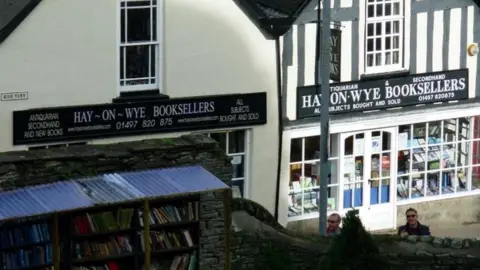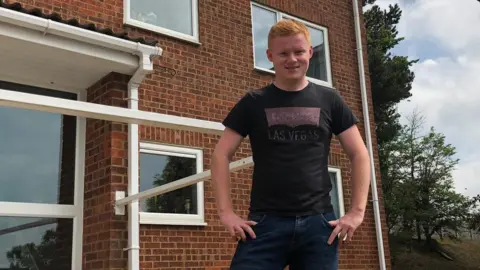New trials planned for cash-stricken communities
 BBC
BBCEight locations across the UK, including an army barracks, have been chosen for trials to help solve problems with access to cash.
Organisers hope they will inform debate over the future of cash in the UK, particularly for those who rely on it.
The Community Access to Cash Pilot will test new subsidised ATMs and local cash deposit centres for retailers.
It comes as a new forecast suggests cash use will fall faster in the UK than in much of Europe.
Millions 'still need cash'
The plan for trials was drawn up in light of a major report warning that the country is "sleepwalking" into becoming a cashless society.
It concluded that eight million people in the UK rely on notes and coins, ranging from those without a bank account to people who are not comfortable with digital payments.
That work was led by Natalie Ceeney, who is also in charge of the pilot projects.
"Over the past decade we've seen a massive shift from cash to digital payments, and Covid-19 has accelerated that trend further. But we know that digital payments don't yet work for everyone, and for many individuals and communities, cash remains essential," she said.
"But the world is changing - we can't just magic back our old bank branch and ATM infrastructure. Instead, we need to use innovation to develop new solutions as well as harness tried and tested approaches to meet people's needs."

'Cash helps me to budget'

Not long ago there were two banks with branches in Ampthill. Then there was one. Now there is none. Currently just one cash machine is left to serve a population of more than 8,000.
Brandon Wilson, 20, is currently on furlough from a civil engineering apprenticeship at Luton Airport.
He said using cash helps him stick more rigidly to his spending plans to ensure he does not spend beyond his means.
"In general I try and budget my daily routine and having the physical money there means it is harder to spend than just placing a piece of card on to a machine," he says.

Some of the places selected for the project are remote communities, such as the village of Botton, North Yorkshire, and Lulworth Camp, a military barracks in Dorset miles away from the nearest cash machine.
Small towns with thousands of residents which have seen bank branches or cash dispensers disappear are also included, such as Ampthill, along with Rochford, in Essex, Denny near Falkirk, and Cambuslang, in Lanarkshire.
Burslem, in Staffordshire, is also on the list, as is Hay-on-Wye, which has a large number of bookshops and other small businesses with no bank branch to deposit notes and coins.
Banks have been persuaded to pay for the pilots, trying out ideas like shared branches, more cashback in shops, as well as better bus services to allow people to visit surviving branches.
Stephen Jones, chief executive of UK Finance, which represents the banks, said the sector was "committed to ensuring that access to cash remains free and widely accessible to those who need it".
The coronavirus outbreak has accelerated the decline of cash use for many people. A recent survey by Link, which oversees the UK's cash machine network, suggested that 75% of people had used less cash during lockdown.
One new forecast by consultants Accenture claimed that cash usage in the UK would drop by 40% this year, compared with 2019 - a faster drop than a 30% predicted fall in the major economies of Europe.
Sulabh Agarwal, from Accenture, said: "One of the key issues facing [retailers] will be how to take payment. While the decline of cash in the UK isn't new, there's little doubt that lockdown and social distancing measures have pushed consumers who typically rely on cash into digital payments."
Gareth Shaw, from consumer organisation Which?, said: "With the existing cash system being pushed closer to the edge of collapse by the coronavirus outbreak, it is clear that new solutions are desperately needed to secure people's access and ability to pay with cash, which millions of people still rely on as their main form of payment."
The results of the pilots will be published in early 2021.
